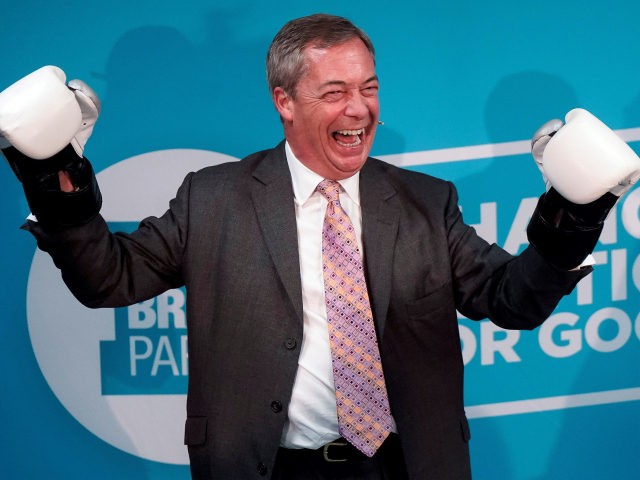Brexit leader Nigel Farage has hailed the passing of the EU trade deal in parliament as “significant moment in our island story”, but says that while the Brexit Wars are over, there are still some battles left to fight, including stopping illegal aliens arriving via the English Channel and getting European supertrawlers out of British waters.
The UK is due to leave the EU’s institutions when the transition period expires at 11 pm on December 31st, 2020, putting into effect the UK-EU trade deal which the British Parliament passed into law late last night.
Addressing supporters on YouTube on Wednesday night, Mr Farage said that while he feels “relief that we’re out”, he cannot feel joy, “because there are aspects of this deal that really are dreadful”, first noting the status of Northern Ireland, which is “in a different constitutional arrangement to the rest of us”, but particularly, the “worst part of the deal for me is fisheries”.
The Brexiteer said at the time of the referendum and the immediate aftermath that fishing would be the “acid test” of a real Brexit. Prime Minister Boris Johnson, and his negotiating team led by David Frost, agreed with the EU another transition period for fishing — termed the “adjustment period” — of five-and-a-half-years, where EU fishermen can still fish in British waters.
While Prime Minister Johnson pledged a “big, £100 million programme” to modernise British fleets and the fish processing industry, in anticipation of taking back full control of British waters, Mr Farage said that the deal signed means “we still don’t own the fish that swim within our exclusive economic zone”.
Boris Johnson's European treaty has passed Parliament, has Royal Assent, is now UK law. The UK will leave the Brexit transition period later today. https://t.co/R4GTNU8Jp2
— Breitbart London (@BreitbartLondon) December 31, 2020
The Brexit leader continued: “After 2026, we will not be making sovereign decisions on who can catch what in British territorial waters. I’m afraid, to increase our quota share after 2026, we would actually have to make compensation to the EU fleet. That’s us paying them for our fleets to catch our fish in our waters. Surely it should be the other way around — they should be paying us to fish in our waters.”
Despite his criticisms, Farage went on to praise the efforts of the prime minister, saying: “Against that, we should praise David Frost and Boris Johnson, because this deal is so much better than that abject surrender negotiated by Mrs May.”
“This is now not an EU treaty — as the previous attempt was — it an international agreement, a treaty between us and the European Union,” he added.
He continued: “It does make us independent in many, many ways… and it does not commit us to regulatory alignment… Whilst there are provisions for the ‘level playing field’ and the committees that will oversee the level of divergence that the UK makes from EU law, it’s perfectly clear in the document that they would not even begin to think about acting in any way unless there were big material differences.
“And I think quick frankly, in five years our patterns of trade with the rest of the world are going to be so different from what they are now that I am less worried about what I saw as the Sword of Damocles than I was before. So there are many aspects to this that are miles better than Mrs May’s deal. You could argue that Boris Johnson inherited a bad hand and hasn’t done a bad job of it.”
‘Even Worse Than I Had Feared’: Farage on Scrutiny of Boris’s Brexit Fishing Deal https://t.co/s9ujsmgT0Z
— Breitbart London (@BreitbartLondon) December 29, 2020
Reflecting on his 27 years as a leave campaigner, he said: “This does mark for me personally a very big, big moment in my life. There are more battles to fight in the future. I want to get the supertrawlers out of the English Channel. I want us to find a way of turning people back to France when they come to this country illegally.
“There are many, many battles to fight, but the best thing about Boris Johnson’s deal is this: it ends the faultline, not just within his own party, but it stops big industry bosses from continuing to scream and shout. It ends the Brexit Wars. It means that we are not going to rejoin the Single Market, we’re not going to rejoin the Customs Union, we’re not going to be rejoining the European Union. We’re certainly not going to join the Euro.
“And there is now a widespread acceptance that this is done. It is the settled will of the people, and there is no going back. That — even if the deal is not perfect — that is a giant leap forward for our country.”
England Will Need to Build Over 100K Houses Per Year to Keep Up with Mass Migration https://t.co/RtmcNjDEra
— Breitbart London (@BreitbartLondon) December 30, 2020

COMMENTS
Please let us know if you're having issues with commenting.